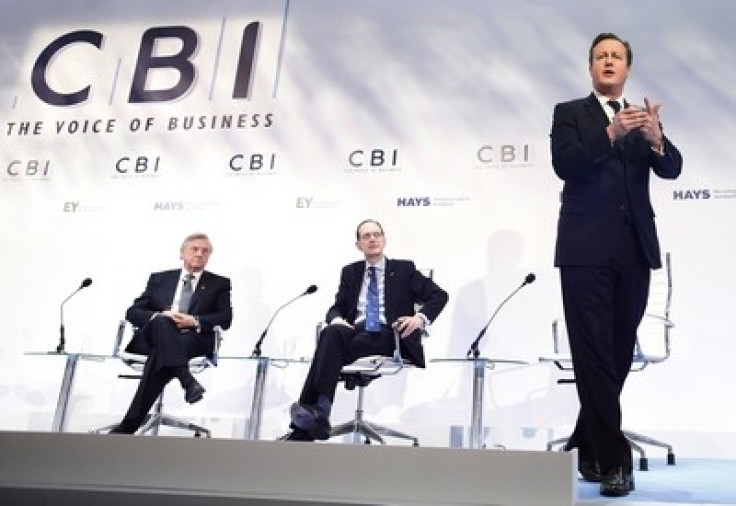David Cameron and Ed Balls Woo Industry Bosses at CBI Conference

It is only a small exaggeration to say the annual conference of the Confederation of British Industries is more important to the political leaders than their own party conferences.
Getting the thumbs-down from the nation's leading industrialists may warm the cockles of the hearts of a few diehard socialists, but what all today's politicians really want is a recognition that they can be trusted to manage the economy from the people who own it.
That is why Gordon Brown spent so many long months on the so-called rubber chicken dinner circuit before the 1997 general election, wooing just these people.
A Tory leader, then, should feel right at home in front of this gathering. His task is largely to remind them he is still on their side, determined to bear down on regulation, reduce taxes, boost business, keep tackling the deficit and, of course, stay in the EU.
A Labour politician, on the other hand, needs to show he is not about hammering capitalists, borrowing like crazy, ruining the economy and turning the UK into a socialist republic. And, of course, he wants to stay in the EU.
So it was no surprise that David Cameron looked relatively comfortable in front of his audience at the London Hilton Metropole hotel when he made one of his off-the-cuff speeches offering just those assurances.
Membership of the EU
There was, however, one area of nervousness and it was, inevitably, over continuing membership of the EU. The CBI insists it is vital and has even warned politicians to stop playing games with Britain's membership - a not-very-coded response to the prime minister's pledge to hold an in-out referendum in 2017.
Cameron addressed it head-on, praising the CBI's support but insisting continuing membership should be of a reformed EU. He did, however, warn that public support for the union was "wafer thin".
The delegates largely accepted that, although many still clearly fear the unpredictable consequences of having offered that referendum.
They also welcomed Cameron's beefed-up campaign to sell the benefits of the HS2 rail link, which he said would "unite the country" and boost the economy, particularly with his pledge to look for new cost savings on the £50bn project.
Shadow chancellor Ed Balls clearly had the more difficult task, particularly after the CBI boss John Cridland said Ed Miliband's conference speech, in which he promised a 20-month energy bill freeze, had "raised the hairs on the back of my neck".
But Balls attempted to reassure the gathering, insisting the freeze would help businesses as well as domestic users. And he promised there would be "no complacency from me and the next Labour government on deficit reduction and spending control."
He also suggested Cameron's cost-saving drive on HS2 was a recognition that his position of supporting it but refusing a "blank cheque" was winning the day.
And he repeated Labour's support for membership of the EU but was less clear about whether it would ever back an in-out referendum.
The CBI liked the commitment to HS2 but was not convinced about energy prices, which they believe is pure popularism.
The real worry for the CBI is the fact that, thanks to the first-ever fixed-term parliament, the 2015 general election campaign is already well under way and, while political leaders are desperate to have the support of business, they also have their eyes firmly fixed on the electorate.
And if there is one group of people the parties want to please more than the CBI then it is the electorate even if that means, on occasion, resorting to popularism.
© Copyright IBTimes 2024. All rights reserved.






